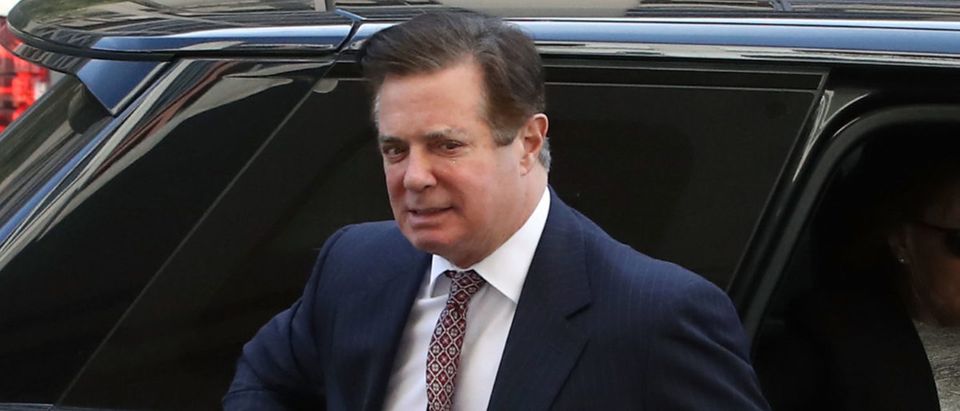- The Guardian is under fire over a questionable article published in November that alleged former Trump campaign chairman Paul Manafort met secretly with WikiLeaks founder Julian Assange.
- But as The Washington Post notes, one of the reporters who helped write The Guardian piece has been accused of fabricating documents provided to The Guardian for a 2014 story about an oil deal between Ecuador and China.
- WikiLeaks and Manafort have vehemently denied the latest story, and The Guardian has issued a tepid response supporting the article.
An Ecuadorian journalist who has been accused of fabricating documents in the past helped write a would-be bombshell for The Guardian in November that alleged former Trump campaign chairman Paul Manafort met multiple times, including during the 2016 presidential campaign, with WikiLeaks founder Julian Assange.
Fernando Villavicencio was listed as one of three reporters, along with Luke Harding and Ben Collyns, on the print version of the Guardian’s story, which was published on Nov. 27. His name was left off of the web version of the article.
As The Washington Post’s Paul Farhi notes, the Ecuadorian government previously accused Villavicencio, a vocal critic of Ecuador’s former president, Rafael Correa, of fabricating documents related to an agreement between Ecuador and China to drill for oil in the Amazon forest. (RELATED: Manafort, WikiLeaks Deny Bombshell Report Of Assange Meeting)
“There is also evidence that the author of this falsified document is Fernando Villavicencio, a convicted slanderer and opponent of Ecuador’s current government. This can be seen from the file properties of the document that The Guardian had originally posted (but which it has since taken down and replaced with a version with this evidence removed),” the foreign ministry wrote on May 27, 2014 in response to an article from The Guardian alleging the oil deal.

WikiLeaks founder Julian Assange, Ecuadorian Embassy May 2017. REUTERS/Peter Nicholls
Villavicencio’s article with The Guardian alleged that Manafort met Assange at the Ecuadorian embassy in London, where Assange is living under asylum, in 2013, 2015 and March 2016.
If true, the story would have major implications for the special counsel’s investigation, which is looking into whether the Trump campaign took part in the hacking of Democrats’ emails during the campaign. Manafort, who has been convicted of tax evasion and bank fraud in the special counsel’s probe, joined the campaign a month after he last allegedly meeting with Assange.
The Guardian report generated widespread shock, but was soon met with skepticism because of the lack of physical evidence supporting the claim. Manafort did not sign a visitor log kept at the Ecuadorian embassy, and no surveillance footage was cited placing Manafort at the embassy.
Instead, the report relied upon anonymous sources who claimed that Ecuador’s intelligence agency has information that Manafort and unnamed Russians visited Assange.
Both WikiLeaks and Manafort vehemently denied the story, claiming that the meetings never occurred. Both sides said they were considering legal action against The Guardian, which is based in the U.K. but has wide circulation across the globe.
Video: Guardian mysteriously hid third author of fabricated front page story “Manafort Held Secret Meetings With Assange” — as revealed by direct digital archive library. Compare to the Guardian’s online version the world saw. Villavicencio background:.https://t.co/KX80IrScyl pic.twitter.com/k6X4cHM6FB
— WikiLeaks (@wikileaks) December 3, 2018
The Guardian’s report took another apparent hit on Monday, when The New York Times reported that Manafort discussed with Ecuador’s president in 2017, handing Assange over to American authorities in exchange for help lowering debt payments.
Observers questioned why Manafort would negotiate the handover of Assange if he could implicate Manafort.
The Guardian has issued a tepid response defending its report.
“This story relied on a number of sources. We put these allegations to both Paul Manafort and Julian Assange’s representatives prior to publication. Neither responded to deny the visits taking place. We have since updated the story to reflect their denials,” The Guardian said in a statement.
A spokesman for the newspaper declined to answer Farhi of The Post when asked why Villavicencio was left off of the web version of the Guardian scoop.
Villavicencio has collaborated with Harding on other stories about Assange’s relationship with the Ecuadorian government. They co-wrote a May 15 piece alleging that the Correa regime spent $5 million spying on Assange’s visitors at the Ecuadorian embassy.
All content created by the Daily Caller News Foundation, an independent and nonpartisan newswire service, is available without charge to any legitimate news publisher that can provide a large audience. All republished articles must include our logo, our reporter’s byline and their DCNF affiliation. For any questions about our guidelines or partnering with us, please contact licensing@dailycallernewsfoundation.org.


